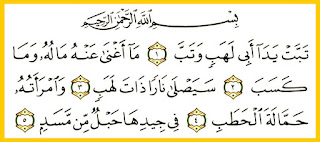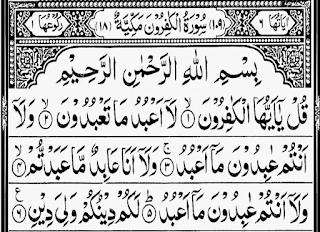Name of the Surah
This surah is called al-Masad, palm-fiber because it mentions that a rope of palm fiber will be around the neck of the wife of Abu Lahab on the Day of Judgment to punish her for abusing Messenger Muhammad [peace be upon him]. Surah Al-Masad was revealed in Makkah. It contains five ayat.
Relationship between Surah Al-Masad and Al-Kafirun
There is a relationship between these two surahs. Surah An-Nasr mentions that Allah will help and give victory to His Messenger Muhammad in the life of this world, and reward him immensely in the Hereafter. Surah Al-Masad refers to the severe punishment that the disobedient will suffer in the life of this world and the Hereafter.
Most Important Topics Discussed in Surah Al-Masad
Surah Al-Masad mentions the evil end awaiting Abu Lahab and his wife for abusing Messenger Muhammad. They would perish in the life of this world, die as disbelievers, and suffer severe punishment in Hell on the Hereafter.
Abdul Allah Ibn Abbas, may Allah be pleased with them, narrated that the following ayah was revealed: [26:214 And warn your clan, your nearest kin.] Then, Messenger Muhammad went out and ascended As-Safa Mountain, and cried saying, ‘O people!’ They said, ‘Who is that crying?’ They were told that he was Muhammad.’ Then, they gathered around him. Messenger Muhammad said, ‘O sons of so-and-so, O sons of so-and-so, O sons of so-and-so, O sons Abud Manaf, O sons of Abdul Al-Mutalib!’ Then, they gathered around him. He said, ‘If I were to inform you that cavalrymen are attacking you from the side of this mountain, will you believe me? They said, ‘We have never heard you telling a lie.’ He said, ‘I am truly a warner, coming to warn you of severe punishment.’ Then, Abu Lahab said, ‘Perish you. Have you gathered us for this news?’ Then, surah Al-Masad was revealed.’
It was narrated that the wife of Abu Lahab heard that a revelation in the Quran was revealed about her husband. Then, she went to Messenger Muhammad, who was sitting beside al-Kaaba with Abu Bakr as-Sadiq. She was carrying a stone. When she stopped, Allah made her unable to see Messenger Muhammad. Thus, she said, ‘O Abu Bakr, I heard that your friend satirize me. By Allah, If I see him, I will hit his mouth with this stone.’ Then, she left. Abu Bakr said, ‘O Messenger of Allah, did she not see you?’ He said, ‘No, she could not see me. Allah made her unable to see me.’
English Translation of Surah Al-Masad
Revealed in Makkah, Contains Five Ayah
Bism-Allah ar-Rahman ar-Rahim
In the Name of Allah, the Giver of Mercy, the Most Merciful
111:1 Perish the hands of Abu Lahab, and perish he!
111:2 His wealth avails him not, nor what he has earned.
111:3 He will burn in a fire, blazing.
111:4 And his wife, the carrier of the firewood.
111:5 Upon her neck is a rope of palm fiber.
Tafsir
111:1 Perish the hands of Abu Lahab, and perish he!
Perish the hands of Abu Lahab and surely he perished because of his animosity to Messenger Muhammad and the truth that Allah revealed to him, namely, the Quran and Islam.
Ibn Zaid, may Allah have mercy on him, said, Abu Lahab said to Prophet Muhammad, ‘What shall I be given if I believe in your message, O Muhammad?’ Messenger Muhammad said, ‘You will be given as the Muslims are given.’ Abu Lahab said, ‘Shall I not have more than them?’ Messenger Muhammad said, ‘What do you want to be given?’ Abu Lahab said, ‘Perish this religion, perish. Shall I and those Muslims be the same?’ Then, Allah, Exalted be He, revealed, [111:1 Perish the hands of Abu Lahab, and perish he!]
111:2 His wealth avails him not, nor what he has earned.
The wealth of Abu Lahab will not avail him, nor what he has earned of the pleasures of the life of this world. They will not protect him against Allah’s severe punishment.
111:3 He will burn in a fire, blazing.
Abu Lahab will burn in the blazing fire of Hell for he used to abuse Messenger Muhammad and fight Islam and Muslims.
111:4 And his wife, the carrier of the firewood.
111:5 Upon her neck is a rope of palm fiber.
Abu Lahab will burn in the blazing fire of Hell and his wife will burn in the blazing fire of Hell too, as she used to carry thorny firewood and put it on the path that Messenger Muhammad used to pass through. Furthermore, a rope made of palm fiber will be put around her neck to increase her punishment and humiliate her because she used to claim that she was a noblewoman in the life of this world.
Reflecting on surah al-Masad, one finds that it confirms the truthfulness of Messenger Muhammad. He informed that Abu Lahab and his wife would die as disbelievers, they would be miserable, and suffer severe punishment in Hell, which happened just as he informed. Abu Lahab and his wife died as disbelievers.
Learned Lessons from Surah Al-Masad
• Surah Al-Masad mentions the severe punishment awaiting Abu Lahab and his wife because they disbelieved in Allah’s Oneness and abused Messenger Muhammad.
• Surah Al-Masad mentions that Abu Lahab would die as a disbeliever, which happened.
• Surah Al-Masad mentions that the wealth of Abu Lahab and his children would not avail him, which happened.
• A rope made of palm fiber will be put around the neck of the wife of Abu Lahab to increase her punishment in Hell as she used to put firewood on the way of Messenger Muhammad to abuse him.
The Noble Quran English Translation of Al-Masad
The Noble Quran English Translation of Tafsir Ibn Kathir Surah Al-Masad
English Translation and Tafsir of Surah Al-Bayyinah
The Noble Quran Surah Yusuf English Translation and Tafsir






